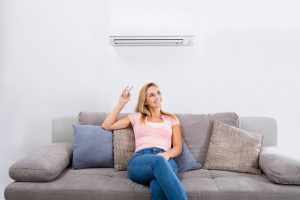Most heating systems have as their main component some sort of heat generator, such as a furnace. These machines generate heat through some form of combustion, which obviously converts energy directly to heat, which is then distributed throughout your Lake Oswego home. That’s a pretty simplified schematic explanation, but that’s more or less how most heating systems work.
Air source heat pumps are another type of heating solution; one that does not actually produce or generate any actual heat. There is no combustion. What an air source heat pump (ASHP) does instead is regulate the temperature of the home by essentially moving air around.
An air source heat pump use electricity to exchange indoor and outdoor air. Think of it like a more versatile air conditioner. In cooling mode, like an air conditioner, an ASHP will pump warm air from the inside out, using a system of refrigerant-filled coils and a compressor. By turning the ASHP to heating mode, the refrigerant flow is reversed, allowing the outdoor coils to extract heat from the outdoor air and pump it in higher concentrations to the inside.
If it seems like a simple system, that’s because it is. All the heat pump does is move heat either in or out, depending on what you need in the current season. Because this process generates no heat on its own, heat pumps can be very efficient. ASHP efficiency has been estimated at 150% to 300%, meaning that the heat energy produced is up to three times as much as the electricity used. That makes for a very efficient home heating and cooling solution.
Air source heat pumps are not necessarily right for every situation, however. In colder climates, where temperatures drop below 30 degrees Fahrenheit for stretches at a time, a heat pump will likely not be able to keep up on its own. In these situations, you may either need to supplement the ASHP with an additional heating source, or use a different system altogether. Newer so-called “cold climate” heat pumps may also be an option. Under ideal circumstances, an air source heat pump can act as a complete home heating system, as well as providing heat for hot water.
If you are looking for a simple and efficient home heating solution in Lake Oswego, look into whether an air source heat pump can work for you.
Continue Reading
Tags: Gladstone, Heat Pumps, Lake Oswego, Portland, Washington County
Posted in Services | Comments Off on What Is an Air Source Heat Pump?
 If you are in the market for a new air conditioning system this year, why not consider a heat pump? These systems are extremely efficient, effective, and can provide year-round comfort with just the flip of a switch (oops, spoilers!) In fact, we can’t see many reasons why homeowners wouldn’t want this type of system in their homes!
If you are in the market for a new air conditioning system this year, why not consider a heat pump? These systems are extremely efficient, effective, and can provide year-round comfort with just the flip of a switch (oops, spoilers!) In fact, we can’t see many reasons why homeowners wouldn’t want this type of system in their homes!